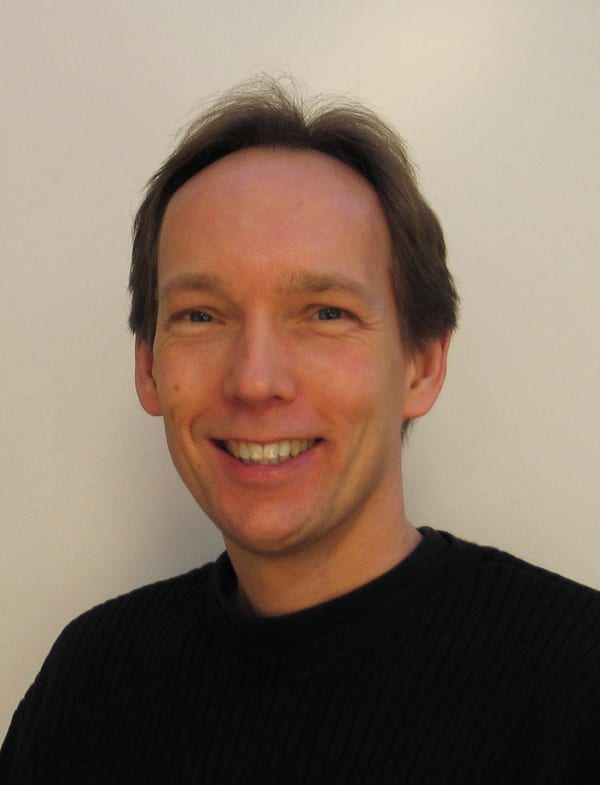The pioneer of future information
Working hard doesn't take you all the way. But working smart is all the more productive. That is the opinion of Erik Helander, systems architect at Saab. He describes innovation as a process where you collaborate, discuss and test ideas — and invest a lot of thinking. Only then will ideas become a reality, says Erik, who has worked with information management for over 30 years — and the majority of those at Saab.
Growing up, Erik first dreamed of being a pilot. On the bedside table in his childhood bedroom, Biggles books had a special place. However, an injury to the eardrum put an end to that dream — to Saab's great advantage. Once Erik sank his teeth into his second-favourite subject, computer science and programming, his career took off.
Artificial intelligence levels it up
Today, he is one of those who's most experienced in his field. Erik feels at home in the furiously fast world of digital development and happily shares his knowledge with younger colleagues. The work of a systems architect includes drawing up guidelines and requirements as well as the design for different computer systems. In Erik's case, the job is about technology information flows.

He tells us that the printed manual is becoming a distant memory; it has been replaced by model-based electronic publications whose data is collected in databases and tagged with different names to be reused and developed. Artificial intelligence learns the data and adds value in endless iterations.
"Information is the key to everything. Why? Well, think of Google to start with."
"I see information management as Saab's most important resource. Why? Well, think of Google, for instance, what would a search engine be without the information it carries?" says Erik.
Sharing is caring — even at Saab
And in the end, it's not just about producing technical information. The flow of data and the ability to tag it allows you to share valuable knowledge and experience with each other in the organisation. You can make compilations, see trends and draw conclusions.
"Digitalisation is only becoming more and more tangible. And I see no end to it. There's an infinite amount to do in this area. Especially when we embrace AI components and machine learning. It's a fascinating time we live in," Erik says.
There are several reasons why he has stayed at Saab. One of them is that the job constantly offers new challenges. What is difficult is also exciting, he thinks.
Interested in joining Erik at Saab? Find your next job here
"A corridor away, something completely different is going on. That's why it's essential to be versatile. On the other hand, there are also specialist functions where a depth of knowledge is important. There's a role for everyone here, I believe."
Sports as a counterweight
Erik has the privilege of working with the very core of digitalisation. It requires vital insight into the business, thorough analysis, and the ability to keep up with emerging trends and technologies. At the same time, a counterweight to committed work is always needed. For Erik, sports bring that distance and balance.
"The possibilities are endless. Machine learning brings a new dimension."
He tells us he's an enthusiastic orienteer and completes at least three training sessions a week. If running isn't on his schedule, it's golf, tennis or badminton. In general, he seeks work-life balance just as much as everyone else, even though his teenage children no longer demand as much of his presence.
It all started with the digital revolution
In thirty years, a lot has happened, and Erik has been able to follow the development up-close. The start of the digital revolution made a strong impression on him. In the late 1990s, Saab began combining different information processes and it opened up new opportunities. In fact, that laid the whole foundation for the massive digitalisation we see today.
"We were out early with this at Saab — and I came on board at the start. You could say that I am a bit of a pioneer in the field," Erik concludes, not without a hint of pride.
3 questions
What my colleagues say when I'm not there:
Can I have some of that experience, please?
Explain something really difficult you work with:
Adapting complex standards to different industries. Now, that's really tricky.
What do you wish you were better at?
I wish I were a little more musical. I really admire people with absolute pitch.
usical. I really admire people with absolute pitch.